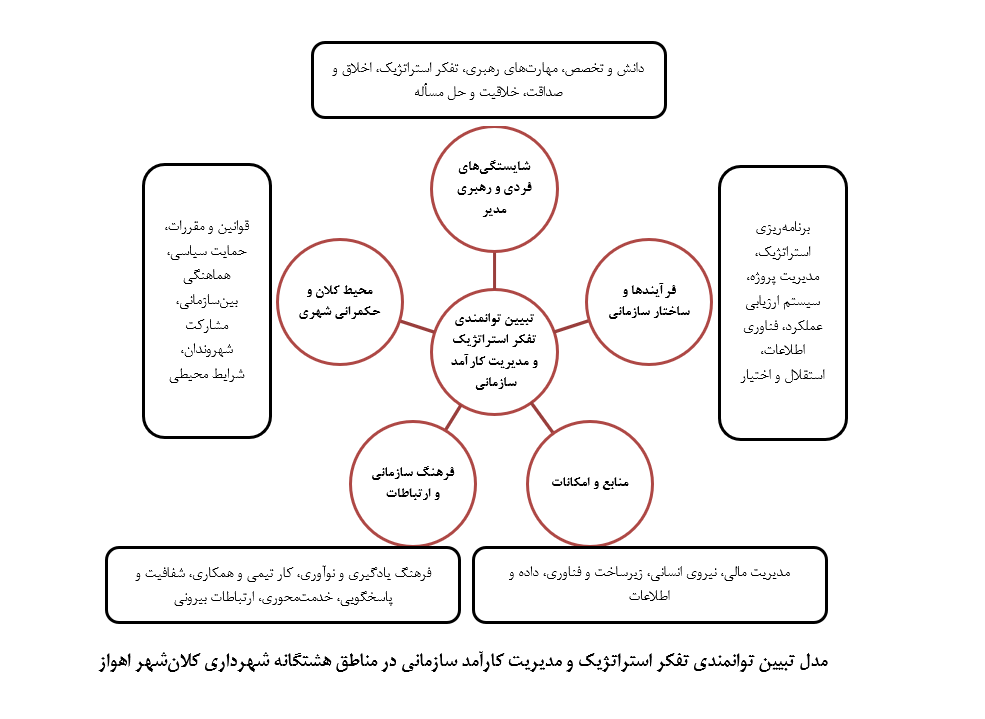شناسایی ابعاد و مولفههای تبیین توانمندی تفکر استراتژیک و مدیریت کارآمد سازمانی در مناطق هشتگانه شهرداری کلانشهر اهواز
کلمات کلیدی:
توانمندی تفکر, تفکر استراتژیک, مدیریت کارآمد سازمانی, مناطق هشتگانه شهرداری کلانشهر اهوازچکیده
این پژوهش با هدف تبیین ابعاد و مؤلفههای مؤثر بر توانمندی تفکر استراتژیک و مدیریت کارآمد سازمانی در مناطق هشتگانه شهرداری کلانشهر اهواز انجام شد. مطالعه حاضر از نظر ماهیت، کیفی و جامعه آماری آن را ۲۰ نفر از شهرداران، معاونان و خبرگان مدیریت شهری تشکیل دادند که به روش هدفمند انتخاب شدند. دادهها بر اساس مصاحبههای نیمهساختاریافته گردآوری و با استفاده از تحلیل محتوای موضوعی مورد تجزیه و تحلیل قرار گرفت. یافتهها نشان داد که مدل مطلوب از پنج بُعد کلیدی تشکیل شده است: شایستگیهای فردی و رهبری مدیر (شامل مؤلفههایی مانند دانش تخصصی و تفکر استراتژیک)، فرآیندها و ساختار سازمانی (مانند برنامهریزی استراتژیک و سیستم ارزیابی عملکرد)، منابع و امکانات (شامل مدیریت مالی و نیروی انسانی)، فرهنگ سازمانی و ارتباطات (مانند شفافیت و خدمتمحوری) و در نهایت محیط کلان و حکمرانی شهری (شامل قوانین و مشارکت شهروندان). این ابعاد در تعاملی پویا، سیستمی یکپارچه را شکل میدهند که غفلت از هر یک از آنها میتواند به عملکرد کلی آسیب بزند. نتایج این مطالعه میتواند چارچوبی علمی برای ارزیابی، آموزش و بهبود قابلیتهای مدیریتی در بدنه شهرداریهای کلانشهرهای ایران ارائه دهد.
دانلودها
مراجع
Aaltola P. Strategic thinking as a critical competency: Conceptual analysis and development model2019.
Danesh Shakib M, Niknam A, editors. Methods of Efficient Human Resource Management and Readiness for Change in Employee Performance. The 11th International Conference on New Perspectives in Management, Accounting, and Entrepreneurship; 2024.
Dixit A, Marthandan G, Oh SL. The antecedents of strategic thinking and its impact on competitive advantage: A conceptual framework. Journal of Strategy and Management. 2021;14(3):345-61.
Masadeh R, Al-Husban D, Al-Abbadi L. The impact of strategic thinking and cognitive ability on competitive advantage: The mediating role of future foresight. Uncertain Supply Chain Management. 2023;11(1):253-60.
Al-Abbadi L, Alsmairat M, Alshawabkeh R, Rumman A. The impact of strategic thinking on organizational excellence: An empirical examination in Jordan's ICT sector. International Journal of Data and Network Science. 2024;8(2):1169-78. doi: 10.5267/j.ijdns.2023.11.017.
Ravanbakhsh M, Elhami M, Sajedi M, Noazri M, editors. Investigating the Relationship Between Efficient Management and Organizational Transformations in the General Department of Education of North Khorasan Province in 2023. The 14th International Conference on New Research Achievements in Educational Sciences, Psychology, and Social Sciences; 2024.
Shayegi-rad M, Mojaradi Z, editors. The Impact of Efficient Management on Employee Organizational Behavior (Patient-Centricity) Through Trust in Senior Managers at Razavi Hospital, Mashhad. The Fourth Annual International Conference on New Developments in Management, Economics, and Accounting, Tehran; 2021.
Shabestani M, Rouhi Fard Z, editors. The Impact of Efficient Human Resource Management on the Growth and Success of Government Organizations. International Conference on Management, Accounting, and Knowledge-Based Economics, Mashhad; 2018.
Nezami Abadi D, Veisi G, Fazlollahi S. Jihadist Management as an Efficient Management Based on Islamic Culture (Concepts, Distinctive Features, and Components). Political-Social Studies of Iranian History and Culture. 2023;2(2):148-70. doi: 10.61838/kman.jspsich.2.2.8.
Kim Y, Park S. Understanding the effects of strategic thinking on organizational performance: A moderated mediation model of absorptive capacity and customer relationship management. Journal of Business Research. 2022;143:103-12.
Saleh MH, Al-Hakimi MA. Linking strategic intelligence, strategic leadership, strategic planning, and strategic thinking and business performance: The moderating effect of strategic flexibility. Future Business Journal. 2024;10:31. doi: 10.1007/s43621-024-00670-.
Fakhraei SS, Hedayatinia Z, editors. Characteristics of an Efficient Manager and Islamic Management Based on the Verses of the Quran and Nahj al-Balagha. The 12th National Conference on Management and Humanities Research in Iran, Tehran; 2022.
Samavi H, editor Strategic Factors of Efficient Human Resource Management in Iranian Electricity Distribution Companies. The First International Conference on the Leap of Management Sciences, Economics, and Accounting, Sari; 2021.
Nasirpour G, Sadeghikia K. The relationship between Emotional Intelligence and Effective Leadership among the Managers of the Islamic Republic of Iran Army staff. Military Science and Tactics. 2022;18(59):199-226. doi: 10.22034/qjmst.2022.130444.1426.
Huang YT, Liu H, Huang L. How transformational and contingent reward leaderships influence university faculty's organizational commitment: The mediating effect of psychological empowerment. Studies in higher education. 2021;46(11):2473-90. doi: 10.1080/03075079.2020.1723534.
Kessi AMP, Pananrang AD, Muchsidin FF, Rizal M, Ramlah R. The Role of Leadership in Effective and Efficient Human Resource Management Decision Making. Paradoks Jurnal Ilmu Ekonomi. 2025;8(2):509-24. doi: 10.57178/paradoks.v8i2.1153.
Chevallier A. Strategic Thinking in Complex Problem Solving: Oxford University Press; 2016.
Barnes K, Vione KC, Kotera Y. Effective Leadership Practice Among Senior Leaders Working From Home and in the Hybrid Workplace Across COVID-19. Sn Business & Economics. 2024;4(5). doi: 10.1007/s43546-024-00651-4.
Madzak A. Enhancing Remote Work Performance Through Effective Leadership. Journal of Information Systems Engineering & Management. 2025;10(10s):826-40. doi: 10.52783/jisem.v10i10s.1532.
Tohidi A, Azizi M, Daneshvar S. The Role of Strategic Thinking in Enhancing the Combat Capability of Military Organizations with an Emphasis on (Intangible Factors of Combat Capability). Strategic Defense Studies Quarterly. 2018;17(76):49-78.
Shamkhi MY, Saleh KM. The Impact of Strategic Thinking on Organizational Excellence an Analytical Model for the National Security Advisory. Revista De Gestão Social E Ambiental. 2023;17(7):e03624. doi: 10.24857/rgsa.v17n7-016.
Rezayat G, Irandoust A. Designing a Thinking Skills Model for Leaders and Managers of Iranian Government Organizations with an Interpretive Structural Modeling Approach. Basij Strategic Studies Quarterly. 2022;25(96):153-87.

دانلود
چاپ شده
ارسال
بازنگری
پذیرش
شماره
نوع مقاله
مجوز
حق نشر 2025 Sajedeh Siyahpoush (Author); Mohammad Reza Hamidizadeh (Corresponding author); Ruhollah Tavallaei (Author)

این پروژه تحت مجوز بین المللی Creative Commons Attribution-NonCommercial 4.0 می باشد.










